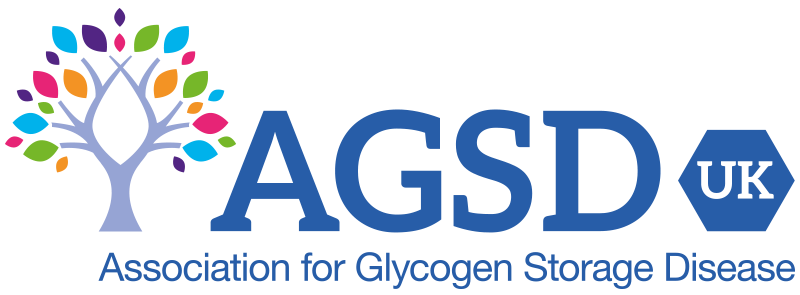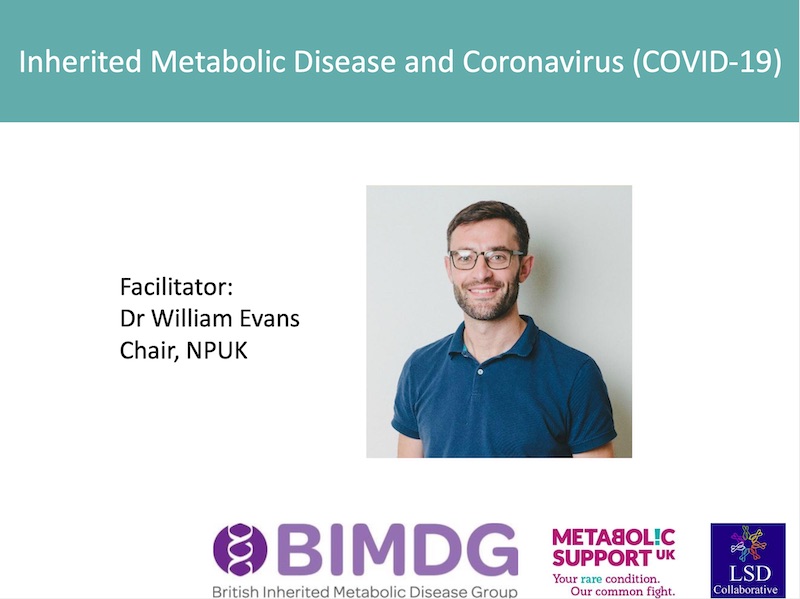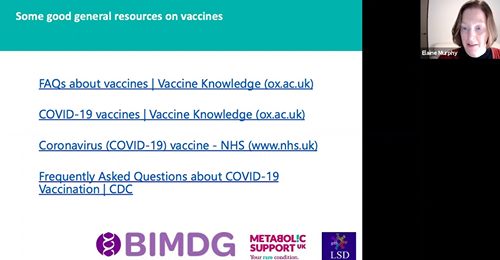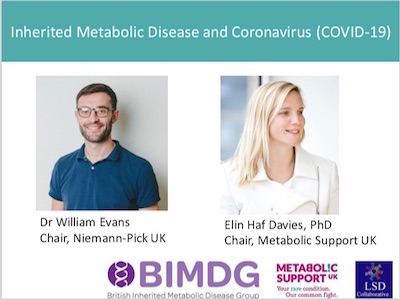Developing information on the COVID-19 pandemic
When visiting this page please ALWAYS refresh your browser window in case there has been an update since you last visited.
For COVID-19 information for McArdle’s go to this page.
23 July 2021
Should Covid-19 vaccines be available for vulnerable children?
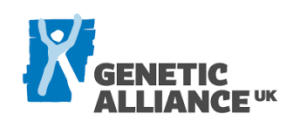 Genetic Alliance were joined at their Community check-in by Dr Liz Whittaker, infectious disease lead at RCPCH, and Senior Clinical Lecturer in paediatric infectious diseases and immunology at Imperial College London to discuss the current situation regarding Covid-19, the risks for children with rare conditions and whether they should be offered the vaccine.
Genetic Alliance were joined at their Community check-in by Dr Liz Whittaker, infectious disease lead at RCPCH, and Senior Clinical Lecturer in paediatric infectious diseases and immunology at Imperial College London to discuss the current situation regarding Covid-19, the risks for children with rare conditions and whether they should be offered the vaccine.
Watch the recording of the meeting below:
![]() Covid-19 vaccines and CEV children
Covid-19 vaccines and CEV children
17 February 2021
Changes to CEV list
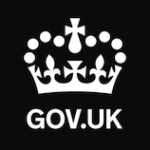 The assessment for being classed as Clinically Extremely Vulnerable (CEV) has been updated to include more people. People who are to be added will be contacted. Anyone who thinks they should be on the list and have not been told are advised to contact their doctor.
The assessment for being classed as Clinically Extremely Vulnerable (CEV) has been updated to include more people. People who are to be added will be contacted. Anyone who thinks they should be on the list and have not been told are advised to contact their doctor.
![]() Definition of clinically extremely vulnerable groups
Definition of clinically extremely vulnerable groups
![]() COVID-19 Population Risk Assessment
COVID-19 Population Risk Assessment
17 February 2021
Unpaid Carers?
Unpaid carers are in cohort six of the Joint Committee on Vaccination and Immunisation’s priority list for the vaccination. Unpaid carers are defined by the JCVI as “those in receipt of a carer’s allowance, or those who are the main carer of an elderly or disabled person whose welfare may be at risk if the carer falls ill”.
Register with your GP if you are an unpaid carer for someone at risk if you fall ill.
This link takes you to a sample letter you can use.
![]() Register as an unpaid carer with your GP – template letter
Register as an unpaid carer with your GP – template letter
Carers are entitled to their own care needs assessment from local social services departments.
09 February 2021
DHSC: Stakeholders FAQs 5 Feb 2021
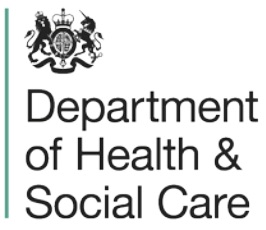
Each week the DHSC produce a document with the latest announcements and developments from the week. The full stakeholder Q&A can be found on the following link:
![]() Covid-19 Vaccine Stakeholder Q&A
Covid-19 Vaccine Stakeholder Q&A
They have also signposted the following useful links:
![]() Bristol University “Global experts urge everyone to talk about COVID-19 vaccines responsibly
Bristol University “Global experts urge everyone to talk about COVID-19 vaccines responsibly
WEBINAR: Vaccines & Metabolic conditions. 4th Feb 8pm
Webinar: The Covid-19 Vaccine and Inherited Metabolic Disease: What You Need to Know
When: Feb 4, 2021 20:00 [8pm UK time]
Please click the link below to join the webinar:
![]() https://us02web.zoom.us/j/81182988249
https://us02web.zoom.us/j/81182988249
To dial-in (for higher quality, select a number based on your current location):
United Kingdom: +44 203 051 2874 or +44 131 460 1196
Webinar ID: 811 8298 8249
International numbers available:
![]() https://us02web.zoom.us/u/kbHPchysJc
https://us02web.zoom.us/u/kbHPchysJc
This webinar has been organised by patient organisations working in the field of Inherited Metabolic Diseases (IMD). We have realised from talking to IMD patients and families that there is some confusion about the COVID-19 vaccines. This webinar will bring together an expert panel to address questions and concerns relating to the vaccines, addressing misconceptions and myths, and providing practical advice and information.
Doctors Elaine Murphy, Uma Ramaswami and Gauri Krishna (Germainne Pierre tbc) will be presenting information.
Please submit your questions in advance direct to info@npuk.org before 3pm on Monday 1st Feb.
The Webinar will be recorded and available to view after the event.
During the webinar, we will not be able to address questions relating to specific patients or conditions. If you have questions relating to your specific condition or your clinical care, please contact your metabolic team direct.
06 January 2021
Updated FAQ’s on COVID-19 vaccine

Due to some inaccurate reporting on social media, BIMDG have updated their list of frequently asked questions and answers related to the vaccine. They can be found on their website using the link below.
21 December 2020
New Tier 4 guidance for CEV people
Latest advise from the Government for those within the GSD community who have been advised that they are clinically extremely vulnerable.

Many of you will have seen that the UK Government has published new guidance for clinically extremely vulnerable (CEV) people living in areas of the country designated as ‘tier 4’ category of Covid-19 infection risk.
Some of the key differences in tier 4 guidance compared to the other tiers are:
- Shielding support has been reinstated for CEV people living in tier 4 areas, which will be made available from local councils and community pharmacies. This includes support for shopping and medicines delivery.
- If you cannot work from home, then you should not attend work. If your employer can’t adjust your role to work from home, then a number of financial support options are available, including the Coronavirus Job Retention Scheme, Statutory Sick Pay (SSP) or Employment Support Allowance (ESA)
- CEV children should not attend school if advised to stay home by their doctor. However, other children in the household who are not CEV should continue to attend school, and children whose parents or caregivers are CEV should are also still currently advised to go to school.*
*There has been some suggestion by scientists in the media that the new strain of the virus may be more transmissible in children. Research into this is currently ongoing, and we will keep you updated on any developments.
18 December 2020
FAQ’s on COVID-19 vaccine
 BIMDG have provided a list of frequently asked questions and answers related to the vaccine. They can be found on their website using the link below.
BIMDG have provided a list of frequently asked questions and answers related to the vaccine. They can be found on their website using the link below.
17 November 2020
JCVI COVID-19 vaccine advice on priority groups

Further advice from Incisive Health.
Following this morning’s announcement that the MHRA has approved the first COVID-19 vaccine for use in the UK, developed by Pfizer/BioNTech, the Joint Committee on Vaccination and Immunisation (JCVI) has now published its advice on priority groups for the vaccine.
It is worth noting that the prioritisation differs slightly from the JCVI’s interim advice on priority groups published in September, with high risk adults and the clinically extremely vulnerable now slightly higher in the prioritisation list. The final list of priority groups are now prioritised as follow:
- Residents in a care home for older adults and their carers
- All those 80 years of age and over. Frontline health and social care workers
- All those 75 years of age and over
- All those 70 years of age and over. Clinically extremely vulnerable individuals
- All those 65 years of age and over
- All individuals aged 16 years to 64 years with underlying health conditions which put them at higher risk of serious disease and mortality
- All those 60 years of age and over
- All those 55 years of age and over
- All those 50 years of age and over
The Government’s guidance on the clinically extremely vulnerable is described here:
The advice on vaccination does not include pregnant women and those under the age of 16 years because there is limited or no data on the safety of the vaccinations in these groups at this time.
The JCVI advises that only those children at very high risk of exposure and serious outcomes from COVID-19, such as older children with severe neuro-disabilities that require residential care, should be offered vaccination and the potential risks should be discussed with the child’s clinical team.
On CEV adults, the advice notes many individuals who are CEV will have some degree of immunosuppression or be immunocompromised and may not respond as well to the vaccine. The advice therefore says those who are clinically extremely vulnerable should continue to follow Government advice on reducing their risk of infection.
On households of people who are CEV, the advice says once sufficient evidence becomes available on the value of indirect protection the JCVI will consider options for a “cocooning strategy” for immunosuppressed individuals, including whether any specific vaccine is preferred in this population.
For people aged 16-64 with underlying health conditions, the JCVI say they had good evidence that the absolute increased risk of this group is lower than the increased risk in people over the age of 65 years. The list of underlying health conditions included is described in the JCVI’s statement.
17 November 2020
Guidance from Incisive Health
This is for the attention of those within the GSD community who have been advised that they are clinically extremely vulnerable.

The Department of Health and Social Care has updated guidance for the clinically extremely vulnerable in line with the new national restrictions.
The guidance advises that the clinically extremely vulnerable should stay at home at all times, unless for exercise or medical appointments.
Furthermore, those who cannot work from home should not go to work, but people in the same household may enter their usual work place in line with the national restrictions. School children who previously self-isolated can still attend school, unless informed otherwise.
The UK Government has been in the process of contacting those who are being advised to shield with the latest guidance issued on Wednesday 4 November. The Government has now made available online the letters sent to clinically extremely vulnerable groups, for reference only, including in accessible formats.
13 November 2020
Government’s advice for clinically extremely vulnerable in England
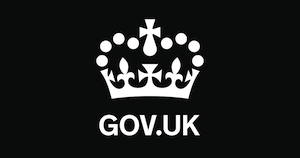 There is updated advice as of 11 November.
There is updated advice as of 11 November.
This guidance is for everyone in England who has been identified as clinically extremely vulnerable. If you are in this group, you will previously have received a letter from the NHS or from your GP telling you this. You may have been advised to shield in the past.
This guidance applies to clinically extremely vulnerable individuals only. Others living in a household with someone who is clinically extremely vulnerable are not advised to follow this guidance. They should instead continue to attend work and school in accordance with the general advice and regulations set out in the national restrictions guidance from 5 November.
20 October 2020
Government’s updated advice on shielding
 There is updated advice as of 15 October. The Government has published guidance on shielding and protecting people defined on medical grounds as extremely vulnerable – following the recent additional COVID-19 restrictions announced. It replaces previous guidance on shielding. The guidance is set out in 2 parts:
There is updated advice as of 15 October. The Government has published guidance on shielding and protecting people defined on medical grounds as extremely vulnerable – following the recent additional COVID-19 restrictions announced. It replaces previous guidance on shielding. The guidance is set out in 2 parts:
- Updated advice on protecting the clinically extremely vulnerable (CEV), based on local COVID alert levels. This advice is less restrictive than previous shielding advice
- Updated shielding advice that is more targeted and will only apply in some of the worst affected areas and only for a limited period of time. Here, the Government only advises to follow shielding advice if you receive a new written shielding notification.
19 August 2020
Reliable COVID-19 advice
 This useful website from the Medicines and Healthcare Products Regulatory Agency (MHRA) provides regularly updated information on a wide range of COVID-19 subjects, including:
This useful website from the Medicines and Healthcare Products Regulatory Agency (MHRA) provides regularly updated information on a wide range of COVID-19 subjects, including:
- COVID-safe guidance in different working locations.
- Research into treatments and vaccines.
- The interaction between medicines and COVID-19 treatments.
14 July 2020
Government’s further update to shielding advice
 The Government has again updated its shielding guidance. The majority of children currently considered extremely clinically vulnerable to COVID-19 will be able to be removed from the shielded patient list. Again, if you or your children are shielding, when reading the update please remember to consider your personal symptoms, any other conditions you may have, the prevalence of cases in your area and your own needs and preferences. Follow our link below.
The Government has again updated its shielding guidance. The majority of children currently considered extremely clinically vulnerable to COVID-19 will be able to be removed from the shielded patient list. Again, if you or your children are shielding, when reading the update please remember to consider your personal symptoms, any other conditions you may have, the prevalence of cases in your area and your own needs and preferences. Follow our link below.
23 JUNE 2020
Government’s updated advice on shielding
 There is updated advice as of 23 June, taking into account that coronavirus COVID-19 infection rates have decreased significantly over the last few weeks. If you are shielding, when reading the update please remember to consider your personal symptoms, any other conditions you may have, the prevalence of cases in your area and your own needs and preferences. Follow our link below.
There is updated advice as of 23 June, taking into account that coronavirus COVID-19 infection rates have decreased significantly over the last few weeks. If you are shielding, when reading the update please remember to consider your personal symptoms, any other conditions you may have, the prevalence of cases in your area and your own needs and preferences. Follow our link below.
19 JUNE 2020
Rare diseases: Risks and opportunities posed by COVID-19
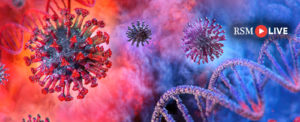 RSM have a FREE webinar on Monday 22nd June from 12.30 to 13.35. You do not need to be a member to attend.
RSM have a FREE webinar on Monday 22nd June from 12.30 to 13.35. You do not need to be a member to attend.
The webinar will bring together experts from different parts of the rare disease community: primary care, advocacy and medical genetics services. The panel will be discussing the ongoing issue of shielding advice including the real impact it’s having on rare disease families. Dr Elizabeth and Dr Menzies will be discussing their new online risk stratification tool.
9 JUNE 2020
COVID-19 webinar, 11 June
 The next BIMDG webinar on COVID-19 is this Thursday, 11 June, 12.30 to 13.30. An expert panel will address the latest updates on COVID-19 and the next steps for patients. A recording will be available afterwards for anybody unable to join live. Use the lnk below to join the webinar and when prompted enter the password IMD2.
The next BIMDG webinar on COVID-19 is this Thursday, 11 June, 12.30 to 13.30. An expert panel will address the latest updates on COVID-19 and the next steps for patients. A recording will be available afterwards for anybody unable to join live. Use the lnk below to join the webinar and when prompted enter the password IMD2.
4 JUNE 2020
Grid to help assess risk and the need for self-isolation
![]() A grid has been made available by the British Society for Genetic Medicine and the Clinical Genetics Society as a guideline for clinicians and patients with rare genetic diseases, to help them decide on their degree of self-isolation. It is an amalgamation of COVID-19 risk advice from relevant specialities and BSGM’s COVID-19 statement. The purpose is to open a conversation with the patient’s primary physician – not replace individualised advice.
A grid has been made available by the British Society for Genetic Medicine and the Clinical Genetics Society as a guideline for clinicians and patients with rare genetic diseases, to help them decide on their degree of self-isolation. It is an amalgamation of COVID-19 risk advice from relevant specialities and BSGM’s COVID-19 statement. The purpose is to open a conversation with the patient’s primary physician – not replace individualised advice.
1 JUNE 2020
Government’s updated advice on shielding
 There is updated advice as of 31 May. If you are shielding, when reading the update please remember to consider your personal symptoms, any other conditions you may have, the prevalence of cases in your area and your own needs and preferences. Follow our link below. In particular, scroll down to the section headed “Staying at home and shielding”.
There is updated advice as of 31 May. If you are shielding, when reading the update please remember to consider your personal symptoms, any other conditions you may have, the prevalence of cases in your area and your own needs and preferences. Follow our link below. In particular, scroll down to the section headed “Staying at home and shielding”.
29 MAY 2020
Guidance on neurological conditions
 Updated version of guidance by the ABN in regard to neurological conditions and COVID-19 (replaces our post of 6 April). There is a very small section (bottom of page 10) specific to GSDs, which mentions GSDs 2, 5, 7 and 13. However, their more general comments help to give an understanding of what the impact of COVID-19 infection could be for any GSD patient with neurological involvement.
Updated version of guidance by the ABN in regard to neurological conditions and COVID-19 (replaces our post of 6 April). There is a very small section (bottom of page 10) specific to GSDs, which mentions GSDs 2, 5, 7 and 13. However, their more general comments help to give an understanding of what the impact of COVID-19 infection could be for any GSD patient with neurological involvement.
27 MAY 2020
Benefits advisor joins team
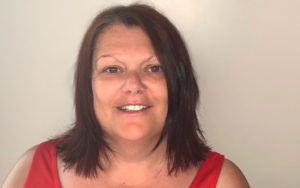 Due to a large increase in requests for help regarding state benefits during the COVID-19 pandemic, AGSD-UK has made a temporary appointment of an advisor.
Due to a large increase in requests for help regarding state benefits during the COVID-19 pandemic, AGSD-UK has made a temporary appointment of an advisor.
26 MAY 2020
Call for questions – webinar on COVID-19
 Please submit your questions by 5pm on Friday 29 May, for the next BIMDG webinar. An expert panel will address the latest updates on COVID-19 and the next steps for patients. The webinar is to be held on Thursday 11 June. As before, a recording will be available afterwards for anybody unable to join live.
Please submit your questions by 5pm on Friday 29 May, for the next BIMDG webinar. An expert panel will address the latest updates on COVID-19 and the next steps for patients. The webinar is to be held on Thursday 11 June. As before, a recording will be available afterwards for anybody unable to join live.
Please submit your questions via email to Metabolic Support UK.
21 MAY 2020
Government’s recovery strategy
 The government has published its strategy for exiting the lock-down, avoiding a second peak of COVID-19 infections and recovery of the economy. The strategy document is available to the public. This may be of particular interest to those who are needing to shield due to a GSD, or for any other reason. Be warned it is an 80 page document, but there is a comprehensive contents list to help you find what you want.
The government has published its strategy for exiting the lock-down, avoiding a second peak of COVID-19 infections and recovery of the economy. The strategy document is available to the public. This may be of particular interest to those who are needing to shield due to a GSD, or for any other reason. Be warned it is an 80 page document, but there is a comprehensive contents list to help you find what you want.
12 MAY 2020
Rare disease COVID-19 survey
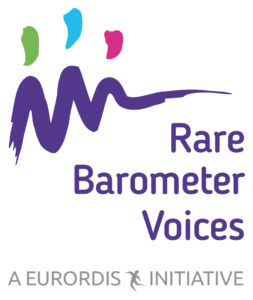 A new Rare Barometer survey on rare disease patients’ experience of COVID-19 is now available online from EURORDIS. Please take the survey in just 15 minutes and help strengthen the Rare Disease voice. Closes on 17 May.
A new Rare Barometer survey on rare disease patients’ experience of COVID-19 is now available online from EURORDIS. Please take the survey in just 15 minutes and help strengthen the Rare Disease voice. Closes on 17 May.
Read our news story for details.
6 MAY 2020
Are you needing to self-isolate?
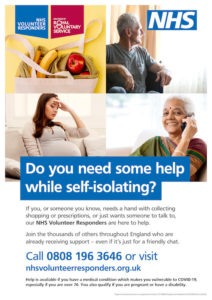 Whilst AGSD-UK can provide information and support nationally, it is impossible for us to provide practical support locally across the UK. But if you are needing to self-isolate, NHS Volunteer Responders are now there to help locally, with shopping, collecting prescriptions or just for a chat. They are contactable by phone or through their web site.
Whilst AGSD-UK can provide information and support nationally, it is impossible for us to provide practical support locally across the UK. But if you are needing to self-isolate, NHS Volunteer Responders are now there to help locally, with shopping, collecting prescriptions or just for a chat. They are contactable by phone or through their web site.
Click on the leaflet for a full size view.
1 MAY 2020
McArdle disease update
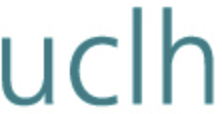 A circular letter has been sent by the NHS, headed UCLH but signed as from the National Hospital for Neurology and Neurosurgery Consultant Team, dated 24 April. It appears this has been sent to a wide list of patients attending clinics at the hospital, including people with the McArdle’s. It advises recipients to undertake shielding for at least 12 weeks from 24 April. We have confirmed that in fact the more specific letter from Prof. Quinlivan at the McArdle clinic dated 2 April (see below) is the one to follow. There is NOT a general requirement for all people with McArdle’s to shield. Patients may need to shield for other medical reasons, as set out in both letters, or may feel they should do so if they feel at risk of an episode of rhabdomyolysis during this period. If uncertain what to do patients of the clinic may contact them for advice – details on the letter of 2 April.
A circular letter has been sent by the NHS, headed UCLH but signed as from the National Hospital for Neurology and Neurosurgery Consultant Team, dated 24 April. It appears this has been sent to a wide list of patients attending clinics at the hospital, including people with the McArdle’s. It advises recipients to undertake shielding for at least 12 weeks from 24 April. We have confirmed that in fact the more specific letter from Prof. Quinlivan at the McArdle clinic dated 2 April (see below) is the one to follow. There is NOT a general requirement for all people with McArdle’s to shield. Patients may need to shield for other medical reasons, as set out in both letters, or may feel they should do so if they feel at risk of an episode of rhabdomyolysis during this period. If uncertain what to do patients of the clinic may contact them for advice – details on the letter of 2 April.
24 APRIL 2020
Updated advice from Adult LSD centres re Pompe
Updated guidance, prepared on 17 April by the Adult LSD clinical centres, on home care and clinical support for those affected by lysosomal storage disorders. This specifically updates the information around infusions and replaces the guidance from the centres given here on 25 March, see below. Please note that the advice for children remains as previously given.
8 APRIL 2020
Liver disease updates
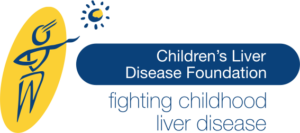 News of how the COVID-19 pandemic is affecting the Children’s Liver Disease Foundation and their research funding. Plus a link to their coronavirus news update web page, which includes details of the launch of a series of “Coffee & Catch Up” sessions for Children and Families.
News of how the COVID-19 pandemic is affecting the Children’s Liver Disease Foundation and their research funding. Plus a link to their coronavirus news update web page, which includes details of the launch of a series of “Coffee & Catch Up” sessions for Children and Families.
8 APRIL 2020
Tips from Independent Living
![]() There are some useful links to COVID-19 related information in this month’s newsletter from Independent Living. One is on nutrition, one on managing self-isolation and there is a warning about fake COVID-19 medications.
There are some useful links to COVID-19 related information in this month’s newsletter from Independent Living. One is on nutrition, one on managing self-isolation and there is a warning about fake COVID-19 medications.
6 APRIL 2020 (Replaced – see our post of 29 May)
Guidance on neurological conditions
 We have just become aware of guidance issued on 22 March by the ABN in regard to neurological conditions and COVID-19. There is a very small section (bottom of page 8) specific to GSDs, which mentions GSDs 2, 5, 7 and 13. However, their more general comments help to give an understanding of what the impact of COVID-19 infection could be for any GSD patient with neurological involvement.
We have just become aware of guidance issued on 22 March by the ABN in regard to neurological conditions and COVID-19. There is a very small section (bottom of page 8) specific to GSDs, which mentions GSDs 2, 5, 7 and 13. However, their more general comments help to give an understanding of what the impact of COVID-19 infection could be for any GSD patient with neurological involvement.
2 APRIL 2020
Guidance from UK McArdle Clinic
 The McArdle Clinic (the UK’s Highly Specialised Service for McArdle Disease and Related Disorders) has written today to those attending the clinic to provide guidance regarding COVID-19 coronavirus. This provides very useful guidance and links. It offers further assistance, mainly by email, should it be needed. It is important to note that this service can be available ONLY to those approx. 250 patients known to the clinic, and not to others in the UK or abroad. However, others may never-the-less download this PDF for information.
The McArdle Clinic (the UK’s Highly Specialised Service for McArdle Disease and Related Disorders) has written today to those attending the clinic to provide guidance regarding COVID-19 coronavirus. This provides very useful guidance and links. It offers further assistance, mainly by email, should it be needed. It is important to note that this service can be available ONLY to those approx. 250 patients known to the clinic, and not to others in the UK or abroad. However, others may never-the-less download this PDF for information.
31 MARCH 2020
Q&A on COVID-19 and Pompe
 The AMDA (Acid Maltase Deficiency Association), the US national support group for Pompe disease, has made available a detailed Question & Answer report prepared with Dr. Priya Kishnani of Duke University.
The AMDA (Acid Maltase Deficiency Association), the US national support group for Pompe disease, has made available a detailed Question & Answer report prepared with Dr. Priya Kishnani of Duke University.
31 MARCH 2020
McArdle walking course in doubt
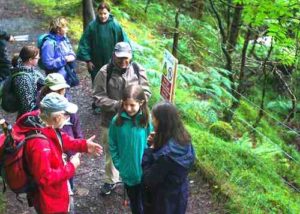 The “Walking with McArdle’s” course in Wales (6-13 August) and the Children & Parents event (13-17 August) are very unlikely to happen. We are liaising with the accommodation to keep options open and might be able to run something if the coronavirus is under control by then. It will be a late decision. If you are keen to attend, please email Andrew Wakelin on type5@agsd.org.uk and he will liaise close to the time.
The “Walking with McArdle’s” course in Wales (6-13 August) and the Children & Parents event (13-17 August) are very unlikely to happen. We are liaising with the accommodation to keep options open and might be able to run something if the coronavirus is under control by then. It will be a late decision. If you are keen to attend, please email Andrew Wakelin on type5@agsd.org.uk and he will liaise close to the time.
30 MARCH 2020
Statement from the Acting Chair
Nick Jones, Acting Chair of AGSD-UK’s Trustee Board has written to all members regarding the COVID-19 situation.
30 MARCH 2020
Register if extremely vulnerable
 For those that have been identified as extremely vulnerable to the coronavirus COVID-19, you are now able to register for help and support. The government wants you to still rely on friends and family in the first instance, but for those who can’t this enables you to register for help for things such as deliveries from supermarkets and pharmacies, and for support from voluntary groups.
For those that have been identified as extremely vulnerable to the coronavirus COVID-19, you are now able to register for help and support. The government wants you to still rely on friends and family in the first instance, but for those who can’t this enables you to register for help for things such as deliveries from supermarkets and pharmacies, and for support from voluntary groups.
Whilst this link is for those in England, the web page also gives links to guidance for those in Northern Ireland, Scotland and Wales.
26 MARCH 2020
Update from Ultragenyx
![]() A reassuring update from Ultragenyx for anyone on their medications or in one of their trials, with contact details should you have any questions.
A reassuring update from Ultragenyx for anyone on their medications or in one of their trials, with contact details should you have any questions.
25 MARCH 2020
Advice from LSD centres re Pompe
On 25 March 2020 a mailing was sent by AGSD-UK to everyone affected by Pompe disease (GSD2). This contained advice which has been created by all the LSD Specialist Centres in the UK, regarding homecare and clinical support. There is different advice for adult and paediatric cases. Copies are available to download here. Please get in touch if you need help.
25 MARCH 2020
Update on McArdle’s
We have an update regarding NHS letters sent to some (not all) people with McArdle’s.
25 MARCH 2020
Advice from AGSD-UK
We have compiled advice from the NHS, WHO and the BIMDG to help the AGSD-UK community stay as safe as possible. Issued by AGSD-UK on 25 March 2020 via email to everyone in the UK with an email address registered with us.
23 MARCH 2020
BIMDG webinar presentation
The  BIMDG webinar held on Monday 23 March 2020, on inherited metabolic diseases and COVID-19, is now available as a video recording to watch on YouTube – running time 1 hour 13 minutes. There is a lot of general information, and GSDs 2 and 3 are mentioned more specifically.
BIMDG webinar held on Monday 23 March 2020, on inherited metabolic diseases and COVID-19, is now available as a video recording to watch on YouTube – running time 1 hour 13 minutes. There is a lot of general information, and GSDs 2 and 3 are mentioned more specifically.
The slides of this webinar are available as a PDF – see button.
18 MARCH 2020
Guidance from BIMDG
![]() Broad guidance onCovid-19 for people with any metabolic disease, such as GSD, is available from the British Inherited Metabolic Diseases Group (BIMDG). Last updated 18 March 2020.
Broad guidance onCovid-19 for people with any metabolic disease, such as GSD, is available from the British Inherited Metabolic Diseases Group (BIMDG). Last updated 18 March 2020.
The 1st BIMDG Webinar was on 23 March 2020. You can download the slides as a PDF – 55 slides, 6mb file, or watch it on YouTube (1 hr 13 min). There is a lot of general information, and GSDs 2 and 3 are mentioned more specifically.
The Covid-19 Vaccine and Inherited Metabolic Disease webinar was on 4 February 2021. You can find it on the LSD Collaborative website, or watch it on YouTube (1 hr 2 min). It talks about who should take it and any particular problems. There is a particularly pertinent section in Elaine’s section for those with GSD 1b.
The 2nd BIMDG Webinar was on 11 June 2020. You can watch the video recording of the webinar (1 hr 27 min), or download the slides as a PDF – 65 slides, 3mb file.
